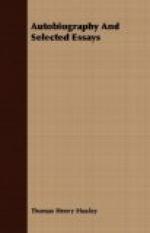According to Huxley’s biographer in the Life and Letters of Thomas Henry Huxley, the essays which represent him at his best are those published in 1868. They are A Piece of Chalk, A Liberal Education, and On the Physical Basis of Life. In connection with the comment on these essays is the following quotation which gives one interesting information as to Huxley’s method of obtaining a clear style:—
This lecture on A Piece of Chalk together with two others delivered this year, seems to me to mark the maturing of his style into that mastery of clear expression for which he deliberately labored, the saying exactly what he meant, neither too much nor too little, without confusion and without obscurity. Have something to say, and say it, was the Duke of Wellington’s theory of style; Huxley’s was to say that which has to be said in such language that you can stand cross-examination on each word. Be clear, though you may be convicted of error. If you are clearly wrong, you will run up against a fact sometime and get set right. If you shuffle with your subject, and study chiefly to use language which will give a loophole of escape either way, there is no hope for you.
This was the secret of his lucidity. In no one could Buffon’s aphorism on style find a better illustration, Le style c’est l’homme meme. In him science and literature, too often divorced, were closely united; and literature owes him a debt for importing into it so much of the highest scientific habit of mind; for showing that truthfulness need not be bald, and that real power lies more in exact accuracy than in luxuriance of diction.
Huxley’s own theory as to how clearness is to be obtained gets at the root of the matter. “For my part, I venture to doubt the wisdom of attempting to mould one’s style by any other process than that of striving after the clear and forcible expression of definite conceptions; in which process the Glassian precept, first catch your definite conception, is probably the most difficult to obey.”
Perfect clearness, above every other quality of style, certainly is characteristic of Huxley; but clearness alone does not make subject-matter literature. In addition to this quality, Huxley’s writing wins the reader by the racy diction, the homely illustration, the plain, honest phrasing. All these and other qualities bring one into an intimate relationship with his subject. A man of vast technical learning, he is still so interested in the relation of his facts to the problems of men that he is always able to infuse life into the driest of subjects, in other words, to humanize his knowledge; and in the estimation of Matthew Arnold, this is the true work of the scholar, the highest mission of style.
III — SUGGESTED STUDIES IN SUBJECT-MATTER, STRUCTURE, AND STYLE
Although fully realizing that the questions here given are only such as are generally used everywhere by instructors in English, the editor has, nevertheless, included them with the hope that some one may find them helpful.




